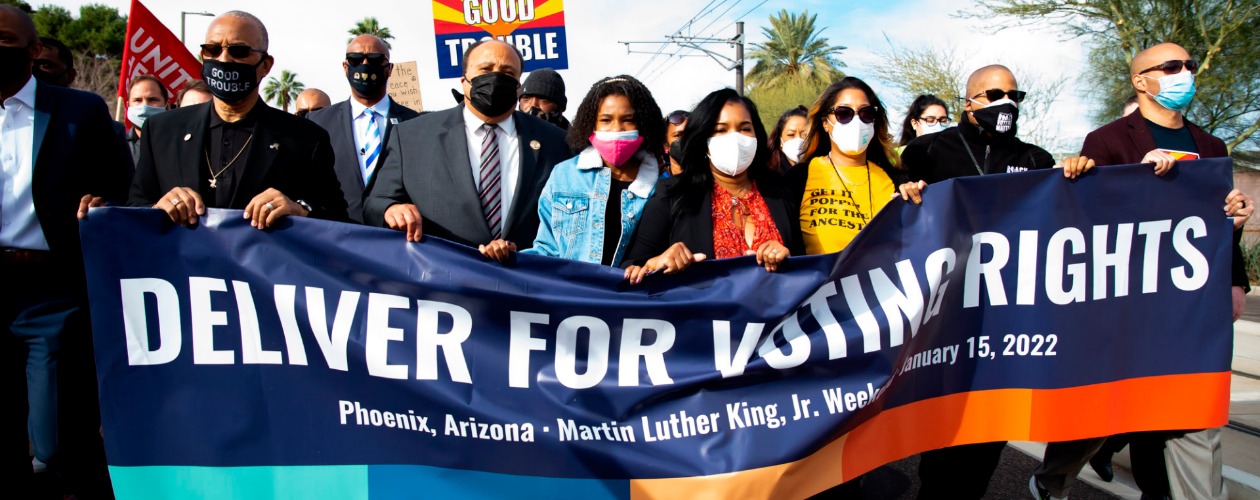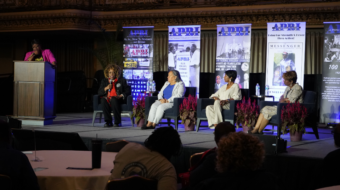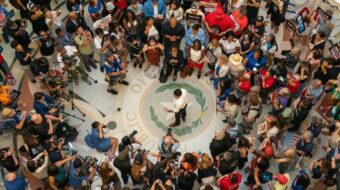
WASHINGTON—With Senate showdowns on two key voting rights bills—the John Lewis Voting Rights Advancement Act and the Freedom To Vote Act—looming, that issue took top billing at the AFL-CIO’s annual Martin Luther King, Jr., conference and in commemorative statements and petitions unions issued and posted nationwide.
The issue is urgent because, as the fabled civil rights leader’s sole grandchild, 13-year-old Yolanda, told another press conference in D.C. on Jan. 17, the official MLK holiday, “I have less voting rights now than the day I was born.” And that oppression hits adults even more.
“We must not give up or be complacent or complicit” about subverting voting rights, Vice President Kamala Harris told the MLK conference. “We must not give up and we must not give in.”

Senate votes are expected on both measures this week. They’re absolutely needed, conference speakers said. And in its own call to action, the ACLU pointed out the obvious: Most of the GOP-enacted state voter repression laws “are racially motivated.” The two federal bills would try to undo them.
The “Freedom To Vote Act would end partisan redistricting, ensure sound election administration, and fix our broken campaign finance system,” Auto Workers President Ray Curry said in his union’s MLK Day statement.
And the John Lewis Act would restore and strengthen the 1965 Voting Rights Act, which two Supreme Court decisions by Republican-named majorities gutted. After those rulings, “red” states have been busy enacting voter repression measures, yanking the right to vote in various ways, with no federal bans or bars. The original Voting Rights Act provided those. The Lewis bill would restore and strengthen them.
Labor sets strategy
“We are living in a crisis, facing serious attacks on voting rights, civil rights, and workers’ rights. And the fate of our democracy hangs in the balance,” AFL-CIO President Liz Shuler, one of the MLK conference keynoters, declared.
The two House-passed bills are designed to curb or kill nefarious voter repression schemes, all promoted by the GOP and—under the radar—its corporate puppeteers. Using filibuster threats, the 50 GOP senators, who represent a far smaller share of the U.S. population, have sidelined past House-passed voter reforms, and plot to do so again.
Two sources have produced the voter repression: Donald Trump’s “Big Lie” about the 2020 election and its focus on voting by people of color, and anti-voter rulings by the right-wing GOP-named U.S. Supreme Court majority. Both sources cater to white supremacists, and their corporate, anti-worker backers.
The first Supreme Court ruling on voting rights, by removing federal “preclearance” of voting changes in states and cities with histories of discrimination, led to a raft of voter repression legislation and racially skewed reappointment and representation plans.
In Michigan, for example, the congressional reapportionment plan throws all three Black U.S. representatives into one district. In Texas, which gained two U.S. House seats due largely to Latino population growth, the GOP state legislative majority gave them no new seats, and threw two Black reps together, too.
The gerrymandered GOP-heavy North Carolina legislature drew a congressional map in that evenly split state to give Republicans 11 of the 14 U.S. House seats. One GOP leader said it would have been 12-2, “but we couldn’t find a way to eliminate another Democrat.”
Other GOP voter repression laws have, among other methods, cut polling hours, made it harder to register and easier to purge voter rolls, curbed mail-in voting, restricted drop boxes for such ballots, required more ID to vote, and—in Georgia—set up long lines while banning people from bringing food and water to standees.
And, just to make sure, several GOP-heavy states transferred power to decide whose ballots get counted and who wins to the paws of partisan, GOP-gerrymandered, legislative majorities. Overall, 19 states have passed at least 33 repression laws since 2020.
The High Court also has severely tilted the playing field against workers and for the corporate class, by allowing unlimited company campaign contributions and individual giving.
Thus the MLK speeches and strategizing about how to put pressure on lawmakers and the union support, statements, and petitions to reverse the repression.
“Organized labor has used our collective voices for civil rights and human rights, to stand up to systemic racism in elections and in the workplace,” and must do so again, Shuler added in her address the first night of the conference, on Jan. 16.
It was a theme often repeated by speakers, awardees, and in group strategy sessions. They also pushed urgency. “The only way to solve this is by organizing and collective action. This is not the time to engage in gradualism,” AFL-CIO Secretary-Treasurer Fred Redmond warned.
“Democracy and rights are like the muscles, including the heart. If we don’t use them, they wither away,” Executive Vice President Tefere Gebre added. “There is no real democracy when anyone is disenfranchised at either the ballot box or the workplace.”
Solutions and ideas to pressure lawmakers, especially resisting Sens. Joe Manchin, D-W. Va., and Kyrsten Sinema, D-Ariz., ranged from petitions—including the AFL-CIO’s—and sit-ins to AFSCME President Lee Saunders’s suggestion of non-violent strikes and boycotts.
He also called on union leaders to “mobilize, educate, and agitate” members to get out in the streets for the cause.
Saunders was the most prominent speaker at the conference to call out the two defiant Democrats by name. With the Senate split 50-50, Majority Leader Chuck Schumer, D-N.Y., needs both their votes, joined to the other 46 Democrats and both independents, to create a tie for the two bills. Democratic Vice President Harris can then break it.
And if that fails, Schumer plans a vote to kill the filibuster, same drill. The filibuster is the racist talkathon threat 41 senators can use to stop the two pieces of legislation, and everything else. Senate Republican leader Mitch McConnell of Kentucky has abused it to do just that.
Stopping the rolling coup against democracy
Besides the MLK delegates, public pressure came from another direction: Marchers across D.C.’s Frederick Douglass Memorial Bridge—named for the famed 19th-century Black civil rights leader and orator—led by the King family. Previously, the Kings, including Yolanda, led other marchers descending on Sinema’s offices in Arizona.
Joined by House Speaker Nancy Pelosi, D-Calif., National Education Association President Becky Pringle, the Rev. Liz Theoharis, co-chair of the Poor People’s Campaign, and others, the Kings, too, demanded the Senate pass the legislation, sending it to Democratic President Joe Biden.
“The NEA will continue to stand—and work every single day—against those who diminish our votes and our power,” Pringle, who heads the nation’s largest union, declared. “Our collective action is the only way we’ll create that just society” King envisioned.
“We’re organizing in every state in these yet-to-be-United States,” Theoharis told the press conference. “We need to be a brigade of ambulance drivers running red lights…of poverty, low wages, poor housing, and abandonment …and oppose those in red states who are engaged in a rolling coup” against democracy.
Biden’s lobbied senators hard for both bills, but Sinema and Manchin have not budged on either civil rights bill or on ending the filibuster. The Republicans are dead set against both bills and killing the filibuster, too.
Various unions, plus the AFL-CIO, not only lauded King but posted online petitions on their websites for members and allies to sign. Yolanda King said other youngsters could campaign, too, by writing letters to Manchin and Sinema, calling their offices, and, of course, “talk to your parents and other adults” to do the same thing.
The Steelworkers posted a sample petition and letter to lawmakers and told their members: “Start writing!”
The Office and Professional Employees also praised Dr. King’s outspoken opposition to the Indochina War and his linkage of economic to political justice.
“His public diagnosis of the issues with American society—what he called ‘the three evils of poverty, racism, and war’—was especially controversial,” OPEIU said. “By bravely speaking out against these evils, Dr. King was reviled by large swaths of the country.

“After passage of the Voting Rights Act, buoyed with optimism but dismayed by what he viewed as morally bankrupt leadership, Dr. King enraged many when he shifted his focus to combating the causes of these societal ills. But Dr. King, who had already persevered despite the overwhelmingly negative opinion many in power had of him, did not waver. That stubborn pursuit of a morally just world—one that wedded the fight for economic and racial justice together—is what drove a white supremacist to assassinate him in 1968.” King was murdered in Memphis while campaigning for unionizing sanitation workers with AFSCME.
Pursuit of that same moral justice is the real way to honor King, by passing the legislation, they added.
Many unions, such as the Utility Workers, included links on their websites to the AFL-CIO’s petition websites. Others, such as the Steelworkers and the National Domestic Workers Alliance, set up their own portals.
“In many states, there has been a calculated and malicious effort to make it harder for voters to cast our ballots,” NDWA said (their emphasis).
“Officials have purged thousands of voters from the rolls, reduced the number of polling places, put in place strict voter ID guidelines, and passed ridiculous laws that prevent organizations like NDWA from supporting communities of color and making a difference when it’s time to head to the polls.
“These attacks weren’t a surprise: While women of color and our communities showed our collective power, there were many who wished to slow down our hard-won progress.”
The Auto Workers, a key moral, political, people-power, and financial backer of King’s famous Aug. 28, 1963, March for Jobs and Justice in Washington, also participated.
“There is still darkness that we must light,” said Auto Workers President Curry. “Today, more than 50 years after the Voting Rights Act was passed, we are seeing a staggering assault on the fundamental right of every citizen to have a voice in our elections. I can think of no other way to describe this effort to disenfranchise millions of Americans, much of which is aimed at communities of color, than SHAMEFUL (his emphasis).
“I see this as yet another round in a fight to the finish.”
After calling the numbers of new repressive laws enacted, 49, and introduced “staggering and frightening,” Curry vowed UAW will “fight on for this most fundamental of rights…through our CAP (political) department” by “pushing back hard at local, state, and national levels.
“The best way our UAW family—and our Congress and elected officials—can honor Dr. King’s vision and the good fight we have been fighting these many years is to advance measures like these. We’re in this for the long haul to protect our voting rights, to safeguard our democracy, and to advance freedom.”










